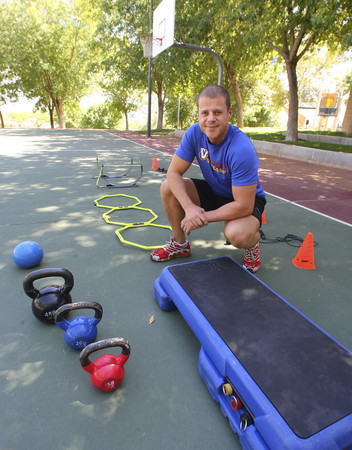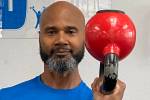Bootcamp leader helps students push their limits and find their fitness
Luckily for Reinier Geyser, Las Vegas has no shortage of people who'll pay to work out until they puke.
Geyser launched Las Vegas Bootcamp, a six-week outdoor conditioning program, in 2007, just before the local economy hit the skids. Despite the timing, Las Vegas Bootcamp has posted growth that most businesses would envy. Its first class, held in a local park, had four graduates. Today, Las Vegas Bootcamp operates out of four parks in Summerlin, Henderson and Southern Highlands, and its most recent class had 125 members.
Geyser, who created a proprietary fitness program for Las Vegas Bootcamp, formed the idea for the exercise initiative while helping personnel at Nellis Air Force Base train for annual fitness tests. His objective? To offer the results of personal training for a price of about $10 per workout.
Las Vegas Bootcamp continues to add programming. Geyser is working on a fitness group for kids, and he's shopping a realty-television series around to networks. He's also chasing his life goal to climb the biggest summits on the seven continents. So far, he's finished Mount Kilimanjaro in Africa and Mount Aconcagua in South America. Next up: Mount Everest, which the South Africa native expects to tackle in June.
Question: What led you to a career in physical fitness?
Answer: My whole life, I've been in sports. At age 16, I had to decide where I would take my studies from there. I felt I had a knack for coaching, because when I was on sports teams, I would always assist in warm-ups and exercising the other players. In South Africa, there were a lot of changes taking place, and at that time, personal training had just started. It looked like a career that would basically have a huge amount of growth in it. Plus, I'd be helping people achieve their goals.
Question: Why did you start the boot camp?
Answer: I was working as a personal trainer at a Nellis gymnasium and had a lot of military personnel training with me. That's when I started the idea of taking this to the public. Not everyone can afford traditional personal training, so I thought if I could start a program where they could get results that were the same as personal training but it was more affordable, it would ultimately be a winner.
Question: Do you scream at people like a boot-camp drill instructor would?
Answer: I'm not usually shouting at people, but it depends on the individual and how they would respond to it. There are certain people I will tell in a louder voice to do more. With other people, it will be more like encouragement. Sometimes, I will partner someone with a person of similar ability in class to push them. In that situation, I monitor them and the partner pushes them. That way, I'm not really the bad guy. The partner is the bad guy.
Question: Who comes to see you?
Answer: There's not really a typical group. Mostly, it's just people who are highly motivated to make a significant change in their fitness level. I have a woman who hasn't trained in 15 years, and in her first eight months, she's run a half marathon, climbed Mount Charleston with me and gone skydiving with me. Before, she was sitting in an office chair and not doing any exercise. Another client I've had for a year has done triathlons and ultramarathons. To keep people accountable, they need to work toward a bigger goal, so within the first couple of months, when they start to build up their confidence, we'll set a bigger goal. This is why I believe my program is so successful. It all goes back to keeping clients as accountable as possible to themselves. They decide how serious they want to be.
Question: Any unusual incidents on the job? Do people ever quit midclass or do so many crunches that they throw up?
Answer: We always have a specific training day we call "hill day" at The Willows. The park has a 45-foot embankment that we do specific exercise drills on. Hill day is usually on Wednesday, but we had switched it to Tuesday one week. One of my clients was driving into the park that day and saw that we had switched and were beginning to do hill day. He just smiled, waved, kept on driving and left, like, "I'm not getting into that today."
We've had multiple situations of people getting really sick. I always say, "If you have to go water the trees, that's OK. We'll see you in a few minutes." We also have a class that is 90 percent housewives. On occasion, they bring their husbands, and the husbands come in saying things like, "Female boot camp, it can't be that hard." Within five minutes of class, the worst students are the husbands. They're kneeling on their knees, breathing really hard and saying they have never experienced anything like it. And these are guys who work out in the gym regularly. Their wives laugh at them big time. We all laugh at them, actually.
Question: Any striking case studies?
Answer: There are so many. We have one woman who is 54 years old. She started a little over three months ago and had never run before in her life. She has lost 30 pounds and just ran her first half marathon in a time of two hours and 20 minutes.
Question: How does people's physical fitness here compare with wherever else you've lived?
Answer: The biggest difference in Las Vegas is people's assumptions about exercise and the weather. People make assumptions about what they can do in the heat before they've even tried it. We train right through summer, and people manage it. It seems as if a lot of people use the extreme heat as an excuse to not do anything. Others like to go to extreme measures and test themselves. You have real opposites.
Question: When do you feel like you accomplished something on the job?
Answer: It's really the small things. Someone who tells me, "For the first time, I could fit into an airplane seat and not feel uncomfortable," or, "For the first time, I spent 30 minutes outside with my kids, running and playing." It's almost like paying it forward. I have clients who come and tell me they lost 20 pounds, and their cousins or friends saw them and decided to start their own program. It has a ripple effect. If I influence one person's life, she will change 20 other people's lives.
Question: Any advice on training based on your personal experiences getting ready to climb Mount Everest?
Answer: The most important thing is to prepare to succeed. You want to think about what you need to do the next day and plan for it. That means getting your food ready, setting time for exercise, having a backup plan if your schedule changes and committing to your program. Other than that, my advice is to just live in the moment. The fun really lies in the whole journey and not just the end result.
Contact reporter Jennifer Robison at jrobison@reviewjournal.com or 702-380-4512.
VITAL STATISTICS
Name: Reinier Geyser.
Age: 33.
Position: Founder and trainer, Las Vegas Bootcamp.
Family: Wife, Kerry Grant Geyser.
Quotable: "The husbands come in saying things like, 'Female boot camp, it can't be that hard.' Within five minutes of class, the worst students are the husbands. They're kneeling on their knees, breathing really hard and saying they have never experienced anything like it. "
Education: Degree in health and nutrition from Tuks University, South Africa; diploma from the Exercise Training Academy in South Africa; certified in spinning, pilates and yoga through Steiner in London.
Work history: Personal trainer in South Africa and England; fitness director and personal trainer onboard ships for Holland America Cruise Line; trainer for Nellis Air Force soldiers preparing for annual military fitness tests; started Las Vegas Bootcamp in January 2007.
Hobbies: High-altitude mountain climbing, adventure racing, biking, rock climbing, running, reading motivational books and autobiographies, spending time outdoors with his wife and their dogs, Birdie and Elvis.
Favorite book: "How To Make Friends and Influence People" by Dale Carnegie.
Hometown: Hoedspruit, South Africa.
In Las Vegas since: 2005.
Las Vegas Bootcamp can be reached at 807-1877 or at www.lasvegasbootcamp.net.




























